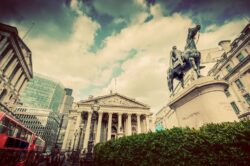If you’ve emailed us any feedback and missed yesterday’s Fortune & Freedom, be sure to check it out now. Nigel and I have a message for you there. As do many of your fellow readers.
If you’re already aware of yesterday’s news, I better explain my cryptic subject line.
Well, what do you do when your computer gets so bogged down it barely works? Or when it freezes and you can’t even move the mouse cursor?
Well, unless you’ve really had it with the bloody thing, you push the CTRL, ALT and DELETE buttons. That’s the tech savvy way of holding down the on/off button.
The idea is that, at some point, things are so tangled you might as well reset the whole thing.
Believe it or not, the same is true of financial systems. And, right now, the leaders of global financial institutions are hinting it’s time to push CTRL, ALT and DELETE.
The IMF has declared “a new Bretton Woods moment”.
That comes in the wake of the World Economic Forum’s (WEF) “Great Reset” theme for its Davos conference.
What are they referring to? A redesign of the international currency system. Something that happens every few decades on average and which completely upends financial markets and trade. It determines the wealth of nations, you might say. As well as investors. Usually for about a generation.
You see, just as each board game has different rules, different international currency and trade systems do too. And so how you play the game, not to mention who wins, changes fundamentally when those currency systems change.
I’ll explain some of those systems and how they worked (until they didn’t) below. But first, understand what a currency reset really means.
A currency reset, like the one the IMF and WEF are referring to, is like swapping which board game is being played by investors, business and governments on the global stage. It changes the rules by which the game of economics and trade is played.
Of course, as you’ll know from Christmas holidays, when the rules of a board game are changed, there’s a huge drama about it. It’s the same for currency resets. They require representatives to sit down together, usually at a plush hotel, and hash out the new rules.
Currency resets of the last century
Bretton Woods was one such currency reset. Arguably, it broke the back of the British Empire’s financial dominance. It ushered in a partial return to the gold standard via the US dollar after World War II. This enshrined America’s dominance into global trade, but kept gold as the anchor of the global financial system.
A pair of resets at the beginning of the 70s brought in an era of monopoly money. The era of exploding debt began as a result. You might’ve heard of the Nixon Shock or the Smithsonian Agreement?
Because money became an abstract concept under the new rules, the game changed fundamentally. We named money “fiat currency”, meaning by decree of the government. Money was what the government decided it was. And it decided how much of it there would be too. There was no longer any constraint to money in the form of gold backing.
Under such a system, debt explodes for a long list of reasons. And money becomes indistinguishable from debt. The amount of money can be manipulated. And central bankers can cut interest rates to keep the system ticking over with ever more debt.
But an international currency order which is defined and controlled by governments is backed by nothing but the rules of the game. And nations’ willingness to play by those rules becomes crucial. Cooperation is required when nothing of objective value backs the system (such as gold).
So the rules had to be changed each time a nation was suffering too much under them. Currencies were revalued under the Plaza Accord and Louvre Accord, for example. To keep nations playing together nicely. A bit like the bailout my little sister used to get at Monopoly.
Eventually we (the world, not my family) transitioned to a world of floating exchange rates – a radical idea at the time and a dramatic currency reset. This was brought on because the old rules simply weren’t working.
But the age of floating exchange rates is one open to too much manipulation. Nations can fiddle with the value of their currency to try and gain export advantages. This is known as “beggar thy neighbour” policy. And printing money is the weapon by which the begging is done, ironically enough.
Covid-19 has upended this by making nations print so much money that the practice has reached absurd levels.
Now, with the world suffering under a pandemic together, the IMF and WEF have decided it’s time to push the reset button once again. CTRL ALT DELETE the financial system.
We have too much debt, too much money printing, an economic crisis and governments are in complete control of our societies.
The rules will be changed. And, if you don’t get one step ahead, you’ll either be a victim of the shift, or fail to make the most of the opportunities it presents.
It’s our job to make sure neither happens to you.
But what exactly have the WEF and IMF said?
Let’s review…
In her speech titled A New Bretton Woods Moment, which sent the shivers down my spine, Kristalina Georgieva, IMF Managing Director, explained that we were once again at a crossroads, as we were when World War II was drawing to a close:
Today we face a new Bretton Woods “moment.” A pandemic that has already cost more than a million lives. An economic calamity that will make the world economy 4.4 % smaller this year and strip an estimated $11 trillion of output by next year. And untold human desperation in the face of huge disruption and rising poverty for the first time in decades.
Once again, we face two massive tasks: to fight the crisis today— and build a better tomorrow.
We know what action must be taken right now.
[…]
We must seize this new Bretton Woods moment
This is where we begin to see how the currency reset will take shape:
[…] debt is unsustainable, it should be restructured without delay. We should move towards greater debt transparency and enhanced creditor coordination. I am encouraged by G20 discussions on a Common framework for Sovereign Debt Resolution as well as on our call for improving the architecture for sovereign debt resolution, including private sector participation.
That “private sector participation” is you, dear reader. You pension fund’s assets, for example, probably include sovereign bonds. Will they be honoured?
Well, I don’t see how debts will be reduced without defaults. But they won’t be called defaults, of course. They’ll be called a currency reset. Changing the rules of the system.What was owed to you might not be under the new rules.
Over at the WEF, the founder of the Davos meetings made things even more clear:
Every country, from the United States to China, must participate, and every industry, from oil and gas to tech, must be transformed. In short, we need a ‘Great Reset’ of capitalism.
Now it might seem odd to you that governments can simply change the rules as they see fit. Or perhaps it doesn’t if you’re aware of the history of just that happening…
Either way, you’ve probably realised it’s important to get one step ahead of how the rules will be changed.
Tomorrow, we’ll take a stab at what might come.

Nick Hubble
Editor, Fortune & Freedom




